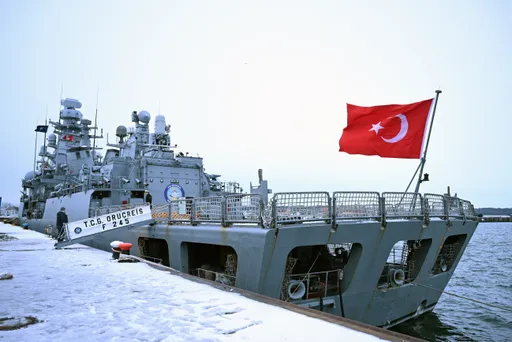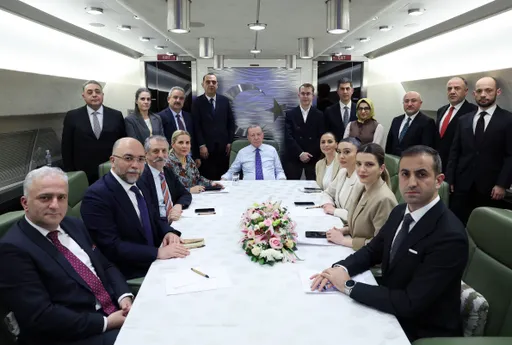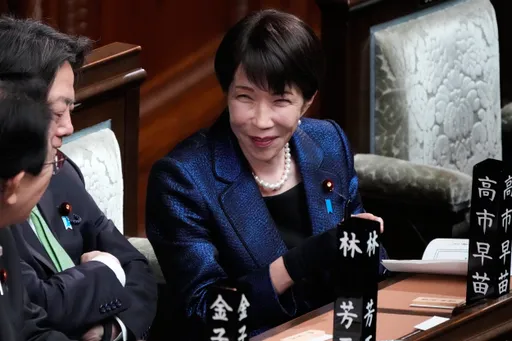Pulwama, India-administered Kashmir —
People walk in scattered groups in twos and threes. They talk in whispers. There are young and old men, and there are women, middle aged and old, many of whom look tired, as they make their way slowly, their hands on their hips.
On this late Saturday morning, they are all walking to the same place, to the house of 20-year-old Adil Ahmad Dar, who carried out the car bombing attack in India-administered Kashmir that killed more than 40 Indian paramilitary personnel last Thursday.
“It is no small feat,” says 52-year-old Sakeena, to whom we offer a ride in the Kakpora village of southern Kashmir’s Pulwama district.
Sakeena and her sister-in-law had already walked for over an hour from her home in Sempora. They are distant relatives of one of Dar’s aunts, they say. Sakeena had seen him seven years ago as a 13-year-old "good looking boy" and her travelling companion had never met him.
“It is a lot of distance to walk on foot (there is a shutdown in Kakpora and adjoining villages), but we had to come," says Sakeena. "Every day two or three (militants) were being killed. Every day. He has at least done something.”
Sakeena’s statements, calling the deadliest attacks on Indian forces in Kashmir’s three-decade insurgency “no small feat”, and saying that Dar had “at least done something”, are remarkably candid assertions. Particularly because everyone else in Dar’s village of Gundbagh, is quiet and apprehensive.
A silence has descended over Kashmir since news of the massive explosion spread. That silence is more palpable here in Dar’s native village and it is almost physical at his uncle’s home, where the family is receiving condolences.
In a small room, young boys and old men are huddled together; their gazes full of suspicion. They are reluctant to comment upon Dar's act, even avoiding voicing their opinions on the Kashmir conflict. One has to rephrase questions several times to elicit some response.
“I just told all the details to a group of journalists who had come before you. Wouldn’t it be better for you to ask them,” says Dar’s uncle, Abdul Rashid Dar. “How many times do I have to say the same thing?”
Abdul is a man in his 60s, with white hair and a trimmed white beard. He and Dar’s father, Ghulam Hassan, are the ones who mostly speak to the journalists that have suddenly descended on this small nondescript village of less than 400 people, asking about the inhabitant who blew himself up alongside over 40 Indian paramilitary men.
At our insistence, Abdul repeats Dar's story once again — that he was 19 when he left home in March 2018 to become a militant, and that he and his closest friend and neighbour, Sameer Ahmad, left together; and that they switched off their phones one evening.
Dar's family searched for him for three days. “And then we went to the police and registered a missing report. Later the police told us he had become a militant,” Abdul says.
Dar was not the first to pick up arms in his family. His cousin, Abdul’s elder son Manzoor Ahmad, was the first. He was killed in a gun-battle by Indian forces within two weeks of joining the armed movement in the region.
“My son was martyred in June 2016, a few days before Burhan (Wani, a popular militant commander whose killing sparked the 2016 mass protests in Kashmir).
“A bullet hit Adil in the leg during those protests when Indian forces fired on the protestors. It took him a while to recuperate. He started studying as a private student (without having to attend school everyday) and started working as a labourer.”
“He would go for every kind of work that came his way, with a carpenter, a mason, a band-saw, anything to bring home some money.”
Abdul says he never thought Dar would become a militant. “Adil (Dar) liked to save little sums of money and bring it home,” he says. “He was into home. That is why I couldn’t believe that he had become a militant.”
After he joined the armed movement, the Indian forces raided his home a few times. On one occasion, the family says, the Indian army locked them inside their house and set it on fire.
“It is God’s will and our courage how we doused that fire,” Abdul says.
The family filed a police report against the army. A few days later, he says, the army turned up again and abused them.
"They said we should not have reported them to the police," Abdul says.
"From 11pm to 2.30am, they made us carry all household items, from bedding to the calendar on the wall out into the courtyard."
Dar’s story before and after his joined the militant movement is not much different from the stories of other young Kashmiri men who have joined insurgent ranks since 2016.
Many experts have described this as "the new wave" of Kashmir’s militancy against the Indian rule in the region, while Dar's attack on the Indian paramilitary convoy on February 14 was the most devastating suicide bombing the three decade long insurgency in disputed Kashmir.
“Did you expect him to do something like this?” we ask. “A suicide attack that killed so many soldiers?”
“How can one expect such a thing?” Abdul replies. “But when one looks at it in the context of what has been happening here, one is not as surprised.”
Almost every conversation here repeatedly halts with accusations that the media is misreporting the situation in Kashmir.
“We say one thing, you write another,” Abdul says, suddenly deviating from his previous line of thought. “Indian soldiers have killed 300 militants in the last year and no one in the world uttered a word, and now Indian soldiers have been killed, and it is different. Why?”
Dar's elder brother, Javid Ahmad, joins in and says that people in Kashmir are being forced to become militants and the militants are being forced to commit acts like the bombing.
“It is the conflict. That is the primary thing. It is a political conflict. India does not want to solve it. India kills unarmed protestors, blinds men, women and children. India kills militants every day. India refuses to engage with the political conflict except with bullets and pellet guns and its military might. What is happening is inevitable in this situation,” he says.
His uncle, Abdul, speaks again, this time about the plight of the parents of the soldiers who lost their sons. “I have lost my son and now my nephew and I understand what it means to lose a son. I saw an old man on TV yesterday, older than me, father of one of the soldiers killed in the blast. And I couldn’t bear to look at him, because he was just like me. White hair, poor, human, distraught. How is he any different than me when I bore my son’s coffin?”
Abdul blames the politicians for these killings. “Their children don’t die in these conflicts, in these Operation All Outs they call for. If all of them had to send their sons to fight on the ground, all hostilities would cease, negotiations would be held to solve issues, Kashmir conflict would suddenly see a real movement toward a political solution,” he says.
One of the older men sitting in the room is the father of Sameer Ahmad, who had joined the militancy the same day as Dar. Ahmad, a former Master’s student in Zoology, is the only active militant from Gundbagh village now. His father, like Dar’s father and uncle, too has quietly accepted the fact that his son most probably would be killed on the path he's chosen.
“Isn’t it the oppression here that makes my son to leave his studies and his home and to pick up the gun? Why would he chose this life if this political conflict was solved politically,” Ahmed’s father says.
“Was India always a free nation?” he suddenly asks. “Were they not slaves of another country? If they became free at some point, why must we always remain slaves? We will not remain slaves. We refuse to be slaves.”
India and Pakistan have fought three wars over Kashmir — a Himalayan region both countries claim in its entirety, but only partially ruling it. A significant number of people either claim independence or seek to join Pakistan. Dar's suicide bombing is one of the manifestations of the brutal conflict that has been raging in the region for over two and a half decades.
Apart from Dar’s uncle and his elder brother, everyone here refuses to give their names, and their pictures, saying they don’t trust the media. Each time one of them opens up, the others look towards them, gesturing for caution.
Although they say they are only afraid of God and no one else, there is a palpable apprehension among the villagers, of looming violence by the Indian forces.
After the attack, India vowed a “jaw breaking” response.
“The country understands the anger simmering within the soldiers and especially CRPF [paramilitary forces whose men were killed]. Security forces have been given full freedom,” Indian Prime Minister Narendra Modi said after the attack.
A CRPF statement said: “We will not forget, We will not forgive.”
In Dar’s village of Gundbagh, they expect night raids, one of young men says, beatings, ransacking of houses, killings, arrests. “But we can’t run away from here. “What has to come will come, and we will be here to face it,” he says.
Along with the fear, one can sense among the people a silent resolve for the inevitable.
The car bombing on Thursday was the third worst attack on Indian forces anywhere. Before last week’s assault, there had been only two major suicide car bombing attacks in Kashmir’s three-decade insurgency. One was in 2000, when a Kashmiri militant belonging to Jaish e Muhammad rammed his explosive-laden car against the Indian army cantonment in Badamibagh Srinagar, the other in 2001, an attack on the Legislative Assembly in which 38 people and three militants were killed.
More than the attack itself, what troubles the Indian armed establishment the most is that Dar was a local Kashmiri, no different from any of the other militants who have been joining the ranks in the renewed armed movement since 2016.
In a video of Dar released immediately after the bombing, Dar, wearing a camouflage jacket and holding a gun, addresses the Indian forces. The video seems to have been recorded just before the attack.
“We don’t ask you to stop your oppression, neither do we beg with folded hands for pity. Instead, your oppression makes our Jihad stronger. Instead of folding our hands, we will with the strength of Jihad break your hands off,” Dar, a militant with the Jaish e Muhammad outfit, says.
Among the militant outfits operating in Kashmir, Jaish e Muhammad is the only one that does not shy away from suicide attacks.
Later in the video, Dar also says: “there are thousands of others like me who are carrying the material for your [Indian forces’] destruction and waiting to reach their destinations.”
The background against which the Thursday’s suicide bombing attack is being seen in Kashmir is the everyday killings of young Kashmiri militants, who have had barely any training in arms.
In 2016, around 150 militants were killed by Indian forces. In 2017, Indian forces launched Operation All Out in Kashmir, the name playing on the name of a popular brand of mosquito killer spray. At least 213 militants were reportedly killed that year.
In 2018, according to the police in the region, over 230 militants were killed in gun battles by the Indian forces. In most of these gun battles, Indian forces have prior intelligence reports about the presence of militants in specific houses, which they then cordon off and, in most cases, blast using explosives. Scores of civilians are wounded, blinded and killed in many of these gun-battles as they attempt to engage the Indian forces to give entrapped militants a chance to escape.
“Once it enters the head of the militants that they will die either way, whether the Indian forces blast the house in which they are hiding or if they blast themselves by hitting an Indian installation, it can change the landscape of militancy in Kashmir,” one of the young men at Dar’s home says. “Not that we think it will change anything in the longer run or that we are one bit happy about what happened in this explosion but it is better to die the way Adil did. What recourse are we left with?”
The militant movement in Kashmir had been pushed into the shadows until 21-year-old Burhan Wani brought it back into consciousness.
Burhan became the face of the new militancy in Kashmir while he was alive and became far more popular after his death, his killing sparking a five-month popular rebellion.
Among the reasons people gave for Burhan’s immense popularity was his younger brother’s killing by the Indian forces, his innocent demeanor in the pictures that flooded the social media in Kashmir, and the often repeated statement from people that he was a “good boy who hadn’t really harmed anyone”.
That was in 2016. In the two and half years since then, with several hundred militants and over two hundred civilians killed, thousands of civilians wounded and incarcerated, the situation in Kashmir has changed. And on Thursday, it escalated to a high not seen since the 1990s when the region had thousands of active militants.
If Dar becomes the new touchstone of militancy in Kashmir, then the resistance movement in the region is set to change. But for now, amid the silence that exists in Kashmir, it is hard to tell anything except the palpable apprehension among Kashmir’s population of greater violence from the state.























